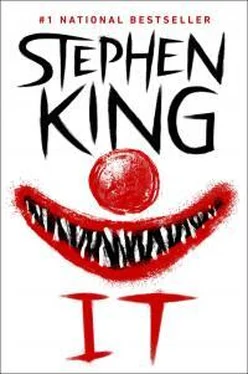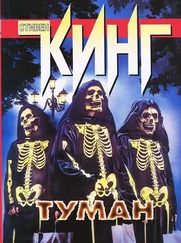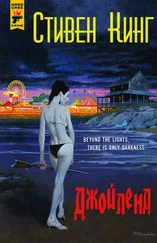Now, though, the river was receding, and when the new Bangor Hydro dam went in upstream, the river would cease to be a threat. Or so said Zack Denbrough, who worked for Bangor Hydroelectric. As for the rest—well, future floods could take care of themselves. The thing was to get through this one, to get the power back on, and then to forget it. In Derry such forgetting of tragedy and disaster was almost an art, as Bill Denbrough would come to discover in the course of time.
George paused just beyond the sawhorses at the edge of a deep ravine that had been cut through the tar surface of Witcham Street. This ravine ran on an almost exact diagonal. It ended on the far side of the street, roughly forty feet farther down the hill from where he now stood, on the right. He laughed aloud—the sound of solitary, childish glee a bright runner in that gray afternoon—as a vagary of the flowing water took his paper boat into a scale-model rapids which had been formed by the break in the tar. The urgent water had cut a channel which ran along the diagonal, and so his boat travelled from one side of Witcham Street to the other, the current carrying it so fast that George had to sprint to keep up with it. Water sprayed out from beneath his galoshes in muddy sheets. Their buckles made a jolly jingling as George Denbrough ran toward his strange death. And the feeling which filled him at that moment was clear and simple love for his brother Bill . . . love and a touch of regret that Bill couldn’t be here to see this and be a part of it. Of course he would try to describe it to Bill when he got home, but he knew he wouldn’t be able to make Bill see it, the way Bill would have been able to make him see it if their positions had been reversed. Bill was good at reading and writing, but even at his age George was wise enough to know that wasn’t the only reason why Bill got all A’s on his report cards, or why his teachers liked his compositions so well. Telling was only part of it. Bill was good at seeing.
The boat nearly whistled along the diagonal channel, just a page torn from the Classified section of the Derry News, but now George imagined it as a PT boat in a war movie, like the ones he sometimes saw down at the Derry Theater with Bill at Saturday matinees. A war picture with John Wayne fighting the Japs. The prow of the newspaper boat threw sprays of water to either side as it rushed along, and then it reached the gutter on the left side of Witcham Street. A fresh streamlet rushed over the break in the tar at this point, creating a fairly large whirlpool, and it seemed to him that the boat must be swamped and capsize. It leaned alarmingly, and then George cheered as it righted itself, turned, and went racing on down toward the intersection. George sprinted to catch up. Over his head, a grim gust of October wind rattled the trees, now almost completely unburdened of their freight of colored leaves by the storm, which had been this year a reaper of the most ruthless sort.
2
Sitting up in bed, his cheeks still flushed with heat (but his fever, like the Kenduskeag, finally receding), Bill had finished the boat—but when George reached for it, Bill held it out of reach. “N-Now get me the p-p-paraffin.”
“What’s that? Where is it?”
“It’s on the cellar shuh-shuh-shelf as you go d-downstairs,” Bill said. “In a box that says Guh-Guh-hulf . . . Gulf. Bring that to me, and a knife, and a b-bowl. And a puh-pack of muh-muh-matches.”
George had gone obediently to get these things. He could hear his mother playing the piano, not Für Elise now but something else he didn’t like so well—something that sounded dry and fussy; he could hear rain flicking steadily against the kitchen windows. These were comfortable sounds, but the thought of the cellar was not a bit comfortable. He did not like the cellar, and he did not like going down the cellar stairs, because he always imagined there was something down there in the dark. That was silly, of course, his father said so and his mother said so and, even more important, Bill said so, but still—
He did not even like opening the door to flick on the light because he always had the idea—this was so exquisitely stupid he didn’t dare tell anyone—that while he was feeling for the light switch, some horrible clawed paw would settle lightly over his wrist . . . and then jerk him down into the darkness that smelled of dirt and wet and dim rotted vegetables.
Stupid! There were no things with claws, all hairy and full of killing spite. Every now and then someone went crazy and killed a lot of people—sometimes Chet Huntley told about such things on the evening news—and of course there were Commies, but there was no weirdo monster living down in their cellar. Still, this idea lingered. In those interminable moments while he was groping for the switch with his right hand (his left arm curled around the doorjamb in a deathgrip), that cellar smell seemed to intensify until it filled the world. Smells of dirt and wet and long-gone vegetables would merge into one unmistakable ineluctable smell, the smell of the monster, the apotheosis of all monsters. It was the smell of something for which he had no name: the smell of It, crouched and lurking and ready to spring. A creature which would eat anything but which was especially hungry for boymeat.
He had opened the door that morning and had groped interminably for the switch, holding the jamb in his usual deathgrip, his eyes squinched shut, the tip of his tongue poked from the corner of his mouth like an agonized rootlet searching for water in a place of drought. Funny? Sure! You betcha! Lookit you, Georgie! Georgie’s scared of the dark! What a baby!
The sound of the piano came from what his father called the living room and what his mother called the parlor. It sounded like music from another world, far away, the way talk and laughter on a summer-crowded beach must sound to an exhausted swimmer who struggles with the undertow.
His fingers found the switch! Ah!
They snapped it—
—and nothing. No light.
Oh, cripes! The power!
George snatched his arm back as if from a basket filled with snakes. He stepped back from the open cellar door, his heart hurrying in his chest. The power was out, of course—he had forgotten the power was out. Jeezly-crow! What now? Go back and tell Bill he couldn’t get the box of paraffin because the power was out and he was afraid that something might get him as he stood on the cellar stairs, something that wasn’t a Commie or a mass murderer but a creature much worse than either? That it would simply slither part of its rotted self up between the stair risers and grab his ankle? That would go over big, wouldn’t it? Others might laugh at such a fancy, but Bill wouldn’t laugh. Bill would be mad. Bill would say, “Grow up, Georgie . . . do you want this boat or not?”
As if this thought were his cue, Bill called from his bedroom: “Did you d-d-die out there, Juh-Georgie?”
“No, I’m gettin it, Bill,” George called back at once. He rubbed at his arms, trying to make the guilty gooseflesh disappear and be smooth skin again. “I just stopped to get a drink of water.”
“Well, h-hurry up!”
So he walked down the four steps to the cellar shelf, his heart a warm, beating hammer in his throat, the hair on the nape of his neck standing at attention, his eyes hot, his hands cold, sure that at any moment the cellar door would swing shut on its own, closing off the white light falling through the kitchen windows, and then he would hear It, something worse than all the Commies and murderers in the world, worse than the Japs, worse than Attila the Hun, worse than the somethings in a hundred horror movies. It, growling deeply—he would hear the growl in those lunatic seconds before it pounced on him and unzipped his guts.
Читать дальше








